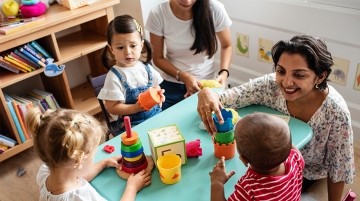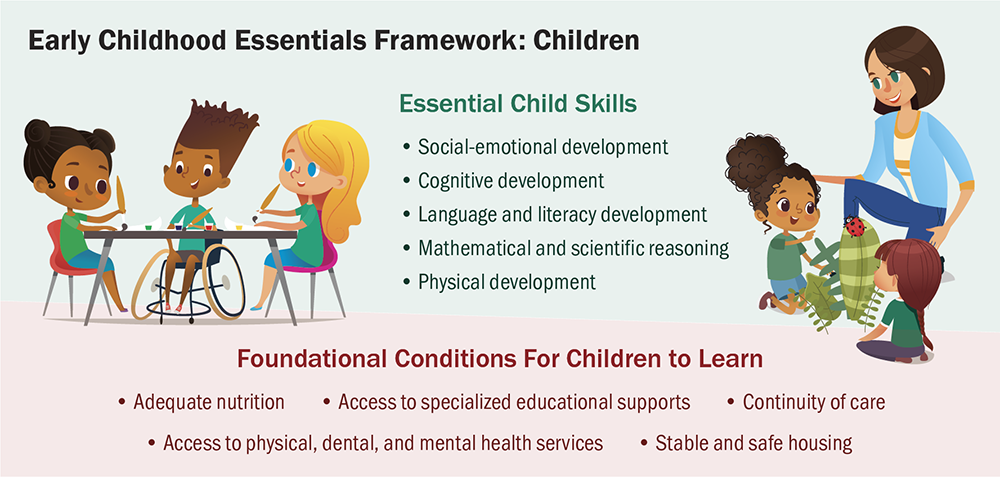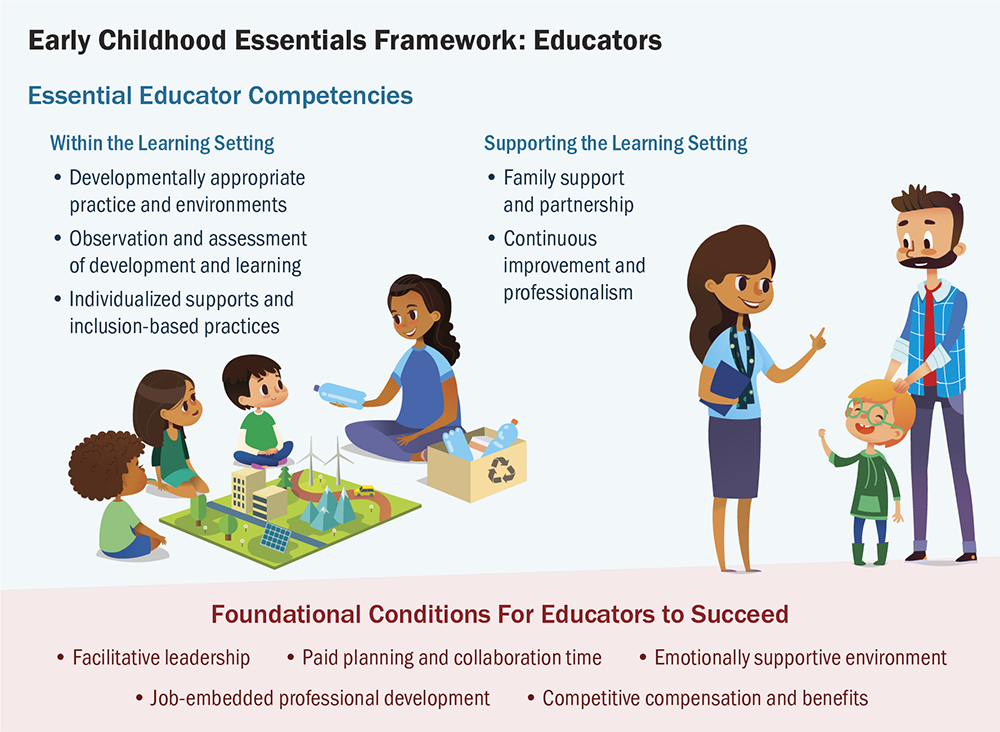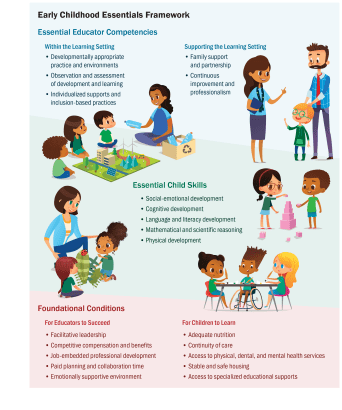Early Childhood Essentials

The Early Childhood Essentials framework presents the essential skills and competencies children should acquire before they enter kindergarten and the related skills and competencies early childhood educators (early educators) must cultivate in order to provide high-quality early learning experiences that will set all children on the path to success in school and in life. It provides a baseline of knowledge to help decisions-makers think critically about how to improve the early learning programs they oversee.
The Essential Child Skills
We analyzed the body of research and guidance that describes developmental trajectories of essential skills for infants, toddlers, and preschoolers that can be influenced and scaffolded by educator practice. From our analysis, we identified five key, interrelated developmental areas:
- Social-emotional development refers to children’s abilities to engage in meaningful relationships with adults and peers; recognize, express, and regulate their own emotions and respond appropriately to the emotions of others; and develop social skills and understanding.
- Cognitive development includes children’s abilities to engage in imitation and symbolic play, as well as their early cognitive skills of executive function, such as holding and manipulating information in their minds, sustaining their attention on a task, shifting their attention when appropriate, and controlling their impulses.
- Language and literacy development captures the ability of children to communicate effectively along a continuum that includes gestures, facial expressions, and eventually language to communicate needs, emotions, and thoughts, as well as early literacy skills that lay the foundation for children to become successful readers and writers as they enter school.
- Mathematical and scientific reasoning encompasses the development of skills—such as number sense algebraic and geometric thinking, and spatial awareness and measurement—as well as young children’s emerging exploration and discovery skills that develop into intentional scientific inquiry skills as they master their worlds.
- Physical development refers to a range of skills, most commonly motor development, that support children’s abilities to explore their environments fully and interact with people and things.

The Essential Early Educator Competencies
Early educators need to acquire and refine a wide-range of essential competencies to provide children with learning and play experiences that promote the development of essential child skills. Based on an analysis of the research and guidance on the essential skills for educators of infants, toddlers, and preschoolers across settings, we identified five key competency areas:
- Developmentally appropriate practice and environments refers to an educator’s knowledge and use of developmentally appropriate practices to support and guide children’s learning across and within each essential child skill area, as well as their ability to effectively construct and manage physically and emotionally supportive learning environments and activities to match the age, cultural, and individual needs of children.
- Observation and assessment of development and learning encompasses an educator’s ability to regularly identify, select, and use observation techniques and assessments to understand the learning progression and trajectory of each child to individualize learning, including techniques that are sensitive to and appropriate for children from non–English speaking homes and who may have experienced trauma and adverse childhood experiences.
- Individualized supports and inclusion-based practices capture an educator’s ability to provide safe and inclusive learning environments and activities; to individualize learning experiences to support all learners, including dual language learners, children with special needs, children who exceed developmental expectations for their age, and children who experience trauma and adverse childhood experiences; and to work collaboratively with a team to provide individualized supports.
- Family support and partnership include educators’ abilities to initiate and engage in regular and responsive communication with families, collaborate with families to ensure consistency between home and the learning environment, and support culturally and linguistically diverse families.
- Continuous improvement and professionalism recognize that early educators are professionals and should have the ability and opportunity to engage in reflection, develop and use professional development plans, participate in professional learning, develop collaborative leadership skills, and maintain professional and ethical standards.

As the framework demonstrates, child development is multifaceted and providing high-quality early learning experiences is complex work. Currently, the odds are stacked against early educators achieving the competencies outlined in the framework because of poor compensation, relatively low standards for preparation, and lack of investment in professional supports, including little or no paid time for professional learning, planning, and collaboration. Early educators need extensive support through college-level preparation and ongoing job-embedded professional development in a supportive environment to be able to consistently provide intentional, individualized learning activities that scaffold each child’s acquisition of essential skills.
State and local policymakers, administrators, and leaders who influence preparation and professional development play an important role in providing funding to support compensation for early educators, and often directly oversee early learning environments. A fundamental understanding of the essential child skills and educator competencies will support leaders in making informed decisions to ensure educators have the resources they need to provide every child with the opportunity to enter kindergarten ready to thrive.
This work was prepared in consultation with and benefited from the insights and expertise of Ranae Amezquita, Krischa Esquivel, Nancy Hurlbut, Sydney Fisher Larson, Peter Mangione, Scott Moore, Mary Vixie Sandy, Vilma Serrano, Deborah Stipek, Erin Sullivan, Ross A. Thompson, and Marlene Zepeda.
Early Childhood Essentials: A Framework for Aligning Child Skills and Educator Competencies by Beth Meloy and Abby Schachner is licensed under a Creative Commons Attribution-NonCommercial 4.0 International License.
This work was supported by a grant from the David and Lucile Packard Foundation. Core operating support for LPI is provided by the Sandler Foundation, the William and Flora Hewlett Foundation, and the Ford Foundation. We are grateful to them for their generous support. The ideas voiced here are those of the authors and not those of our funders.
Updated November 20, 2019. Revisions are noted here.

